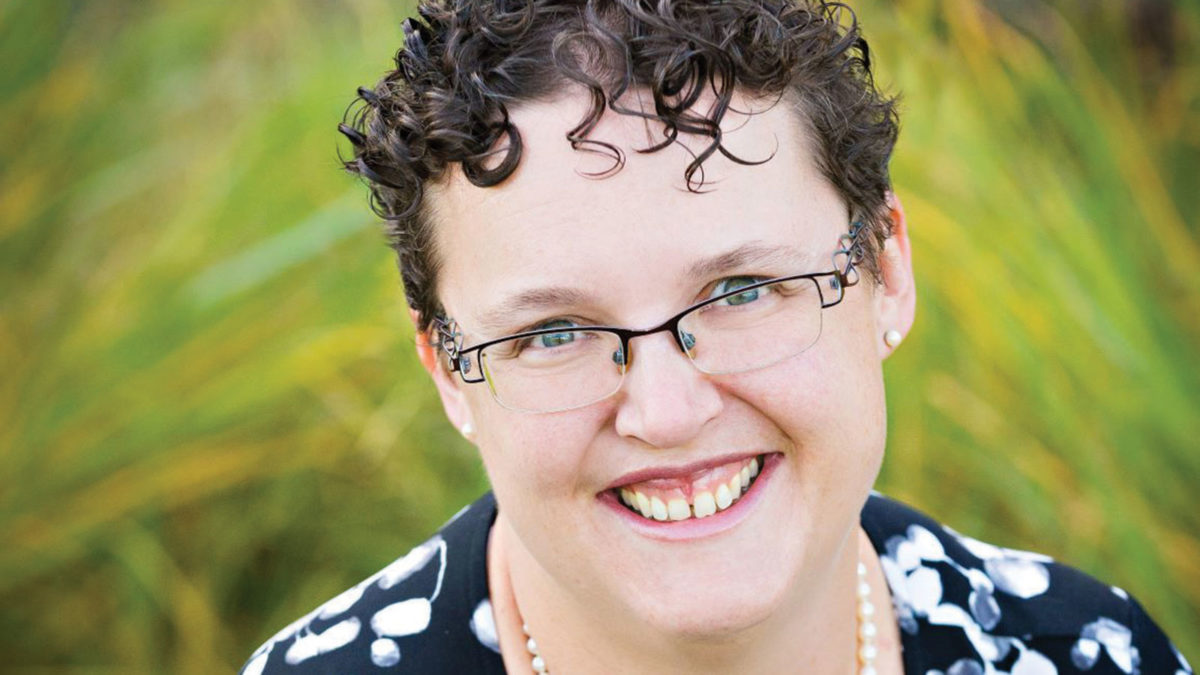
Meggin Rutherford
2021 Outstanding Young Lawyer of the Year
December 2021
Download This Article (.pdf)
This year, the Colorado Bar Association honors Meggin Rutherford as its Outstanding Young Lawyer of the Year. Rutherford heads up her own family law practice, which she opened immediately after law school in the middle of the Great Recession. It was an audacious move to make as a new lawyer, but ultimately a practical one. “I came into law school with the goal to work as a prosecutor,” she says. “I loved my work at the District Attorney’s office in Texas and was proud of what I helped accomplish there. I enjoyed trial and the thrill of working for what I saw as the ‘right’ side. I worked at a DA’s office during two years of law school, but then they had management changes and the recession hit. I was not hired at any DA’s offices. I was crushed, but it turns out to be one of the best failures of my life.
“In the fall and winter of 2009, no one was hiring. So many people were losing their jobs. There were no other opportunities for me to get work at a law firm, so of course I went and worked at Starbucks (but it was in a Barnes and Noble, so I got to read during breaks). My good friend Sheena Moran was going through the same struggle. She said, ‘We have a career, we just don’t have a job. So we can make our own job.’ She jumped in and started her own firm before I did, and that gave me courage. A few months later, I joined her. The choice was not out of bravery or some great thing, but out of necessity. I started in family law because ‘it’s easy,’” (Rutherford laughs about that thought now) “and there are a lot of clients.” (This one is true.)
High Risk, High Reward
“I can’t even list all the challenges that I faced,” she says. “I never intended to be an entrepreneur. I never even intended to work in private practice. I always assumed that I would be employed by the government. I knew nothing about marketing or accounting or client relations. I didn’t even know my own area of law! But thanks to an overabundance of self-confidence, I did it anyway.
“I learned that it’s okay to ask for help. I was very shy about that at first, but thankfully some kind and generous opposing counsels gave me some good nudges in the right direction and offers for me to reach out to them after our cases were done. I also learned that it’s okay to cry when you have no flipping idea what you are doing. And you can get up and try again because now you know, and you learned a lesson.”
Although family law wasn’t what she initially thought she’d practice, Rutherford says she’s stayed with it because of the opportunities it provides to help make people’s lives better. “What really did it was the mediation training with Judy Mares-Dixon. My whole world changed after taking that training. By taking to heart the lessons of really listening, and really working together to find a solution, it revolutionized the way that I am in this world. It taught me emotional intelligence skills that I was not born with, and I have continued to learn more since then.
“Being in family law also helped my family in ways that I never could have imagined. My daughter has a number of mental health conditions that make her wonderful but also challenging to parent. I could not be the parent she needs without the lessons that I learned in family law about understanding other’s perspectives, the ways the brain works, and how to really listen to people in a deep way.”
Balancing Acts
Rutherford’s firm is unique in that it allows her to prioritize her own work-life balance while helping her employees find that balance, too. “I have several young associates and law clerks who said that they didn’t think they would ever find a firm that emphasizes that balance for the employees. They always assumed they would have to build that firm for themselves. I’ve found that having a firm culture that values the whole person, including their non-work time, as important in their work as a lawyer is critical. My employees say they love working here because they truly feel supported and valued as whole people, not just as legal machines to produce as many billable hours as possible.
“As a result, they go above and beyond in everything they do here. They know that they are valued, and so they add extra value to what they do every day. They know that I trust them, and they live up to that trust. They know that I want them to continue to grow and thrive in the firm. To do that, they need to grow and thrive as a whole human, not just a lawyer. Because I emphasize the whole health of my attorneys, I reduce employee turnover, I increase client satisfaction and positive outcomes, and I know that I am helping make better lives for both clients and employees.
“When I was in law school 11 years ago, I think mindfulness and work-life balance were just starting to become ‘a thing’ in the legal profession. But now I know that young professionals are coming out of law school searching for a job that will not burn them out in five years but will be a sustainable life choice for them long term.”
Her advice to others interested in cultivating a more balanced life: “Be mindful about your goals. Write down your personal goals as well as your professional goals. Think about how those goals interact with each other. Is there a way that you can reach both? Or is that impossible? If it’s impossible, then you have some decisions to make. Which one do you change? People often think in black and white—it’s either one or the other—but that can be a false dichotomy. How might you shift one so that they can work together? What creative solutions exist? And then, once you’ve figured that out, make it happen. Don’t be afraid to ask to work from home two days a week or for more flexible hours so you can work after the kids go to bed and take them to school in the morning. Ask for what you need, press for reasonable conditions, and help change the culture and expectation of what constitutes acceptable working conditions.”
Collaborative Practice
Rutherford also counsels that one should never be afraid to seek out support. “Community and mentorship are critical for success and growth. Without the support of other attorneys and their willingness to mentor me, I would not have been able to succeed. I am profoundly grateful for Terri Harrington, Diana Powell, David Littman, and Jane Ebisch, among others, for taking me under their wing and answering the phone anytime I called. It took courage and vulnerability for me to reach out for help, but without it I would not have been able to learn and thrive. I can never pay them back, so I pay it forward. Whenever anyone asks for mentorship or calls with a hard question, I make the time to ensure that I can mentor others. If everyone in our profession did that, we would create exponential change.”
She also found support in the CLEs offered by the CBA. “The first thing I did when I started out on my own was to take all of the CLEs that I could. They were a life saver. Even more important were the presenters. They all offered to answer questions for attendees, and I took several of them up on the offer. Every single one answered questions with grace and openness. The books have been an invaluable resource as well that are well worth the money.”
But it was the scholarship to the Family Law Institute that changed Rutherford and her practice the most. “It was there that I attended the presentation on collaborative divorce by Terri Harrington. Finally, I had an answer to my issue with practicing family law: there had to be a better way to do this outside of court. I went up to her afterward, a converted zealot. She graciously took me under her wing and invited me to the Colorado Collaborative Divorce Professionals (CCDP) meetings. Ten years later, she invited me to help her with the legislation for the Uniform Collaborative Law Act.
“She had been working on getting these statutes passed for 10 years with no success, but suddenly she got a notice that the statutes were going to go before the committee the next morning, and she couldn’t attend. I was able to, so I threw everything together and headed down to the capitol. Every time the statute was sent to a committee, we usually only had a few days’ notice. But a group of us managed to have someone there every time. I didn’t realize how complex the process is to get a law from a legislator’s sponsorship all the way through to the end. I am glad for the process and knew intellectually that there are a lot of hoops, but I didn’t really get it until I helped a bill through it myself. We were also surprised at how quickly it eventually went through when it was approved! We didn’t even know it had passed. I discovered that I love being involved in the legislative process, and I’m so thankful that Terri introduced me to this vital career opportunity.”
Positive Outlook
Through fortitude, flexibility, and collaboration, Rutherford has laid the groundwork for a long and successful legal career. She is a positive model for young lawyers navigating a changing legal landscape and a worthy recipient of the 2021 Outstanding Young Lawyer of the Year Award.
“When I was in law school 11 years ago, I think mindfulness and work-life balance were just starting to become ‘a thing’ in the legal profession. But now I know that young professionals are coming out of law school searching for a job that will not burn them out in five years but will be a sustainable life choice for them long term.”


